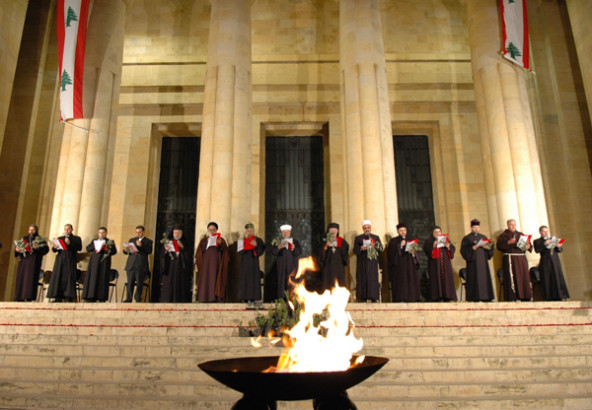I first experienced a car bomb blast in 1983 while teaching at the American University of Beirut during Lebanon’s civil war. Windows shook. Students scattered. I learned how fear of the Other hardens into hatred and metastasizes into violence.
During sectarian bloodshed in 1985, a few young Lebanese perceived a way forward. From every social class and religious confession, they learned to trust each other while risking their lives as Red Cross volunteers. But first aid was not enough. They resolved to start afresh with a new generation.

They conceived a dream: “to gather the entire family of Lebanon, a treasure for humanity, by serving with and for the Other.” They called their embryonic youth movement Offre Joie, the Joy of Giving.
They rediscovered the timeless wisdom that inspired Martin Luther King Jr.: “Love is the only force capable of transforming an enemy into a friend.” To still the vortex of violence, the founders agonized and settled on three non-negotiable values: respect, obviously; forgiveness, a stretch; love, the bottom line.
They persuaded families in ethnic enclaves to entrust their children to ethnically integrated summer camps. Campers enjoyed fantastic fun, but inevitably, fistfights flared. Counselors escorted adversaries into a room together with an ultimatum: “Don’t come out until you can respect, forgive, and love. Or you can leave camp now.”
Kids enter as enemies. They emerge as friends. Trust takes root. After 30 summers, thousands of enduring childhood friendships now link, Other to Other, in every volatile pocket of Lebanon.
During national crises, Offre Joie also rallies volunteers from more than 3,000 youths on call to rebuild destroyed homes and relationships with and for the Other. Total days volunteered have increased annually, from several thousand days in the 1990s to more than 15,000 days in the 2000s.
Aiming Higher Together
Lamentably, sectarian upheavals across the Middle East since 2010 have reignited Lebanon’s smoldering conflicts. As violence resurged, Offre Joie set out to mobilize a broader civil society coalition, engaging top clergy of all religious confessions to publicly pray a common prayer for unity.
 Unity in diversity: clergy of all of Lebanon's confessions join in a common prayer at the National Museum of Beirut. (Photo courtesy of Offre Joie Liban)
Unity in diversity: clergy of all of Lebanon's confessions join in a common prayer at the National Museum of Beirut. (Photo courtesy of Offre Joie Liban)
In 2013, Lebanese of all confessions volunteered an astounding 172,002 days together—rebuilding bombed homes, churches, mosques, and public buildings across the nation. Universities and charities participated. Companies delivered materials. Restaurants donated meals. Ad agency Leo Burnett Lebanon contributed a promotion campaign and an award-winning documentary, Volunteers Seek No Recognition (see below).
Media engaged 45 percent of Lebanon’s population, and in 2013 the President conferred one of the nation’s highest civilian distinctions on Offre Joie.
Offre Joie’s dream is spreading abroad. Iraqis now volunteer with and for the Other, responding to Baghdad bombings and Nineveh Plain expulsions. Egyptians and Syrians are inquiring, as are the French and Americans—and just in time, as sectarian hostilities trend to higher levels globally.
What did Offre Joie offer this coalition? No paid staff. No bank balance. No measurement systems. No infrastructure. No master plan. Those might have helped, but Offre Joie brought something more potent.
Proven Principles for Impact in Hard Places
My wife Janice and I co-founded Dreams InDeed to strengthen indigenous social entrepreneurs in hard places to enable the poor to thrive as God intended. Like midwives, we accompany visionaries to help deliver their dreams.
Just after the August 2006 war, we picked our way with displaced villagers and UN tanks, through unexploded ordinance along Lebanon’s border. Offre Joie volunteers were already sweating there, restoring homes for every returning family. To their surprise, we joined them, building trust by hauling cinderblocks.
Trust deepened as we befriended Offre Joie over 8 years, wrestling to clarify mission, define values, design innovations, and weave networks. Our technical skills added value, but relational accompaniment proved pivotal. Early on, we proposed leveraging networks for impact, but only trust surfaced the critical issues: dreams and values.
1. Pursue dreams, not good ideas.
Only a dream can inspire all to persevere through pain to change together. An alley demarcates two ethnic enclaves dividing one urban tinderbox. Grenades and gunfire erupted during a women’s inter-communal planning meeting hosted by Offre Joie and my wife. Everyone sprinted for cover.
All continued the next day—because they shared a dream. What sets a dream apart from a good idea? We apply four tests:
- A dream is celebrated by the poor, and unsettles the powerful.
- A dream invites everyone to the table, including those we don’t like.
- A dream requires that everyone change, starting with the dreamer.
- A dream is worth bleeding for, not just working on.
Offre Joie routinely declines six- and seven-figure grants offered contingent on publicity, because they perceive the joy of branding subverts the joy of giving. Instead, Offre Joie invites them to volunteer.
2. Practice values, not techniques.
At one Offre Joie camp I visited, kids from every conflicted corner of Lebanon were having the literal time of their lives. A counselor interrupted my private consultation with co-founder Melhem, leaving a 10-year-old camper, Isma’el with us: “He’s been slugging and swearing again.”
Melhem introduced us. Isma’el sat down, fidgeting. Silence. Then Melhem asked, “Hey, could you help me rewind my fax ribbon ... like this?” Isma’el started rewinding. Melhem and I resumed our discussion.
Twenty minutes later, Isma’el finished. Melhem asked, “Is anyone bothering you?” “No.” Melhem probed, “Is there some problem?” “No.” Melhem persisted, “Do you like camp?” “Yes.”
Then Melhem held up three fingers, “What do these mean?” Isma’el shouted: “Love! Forgiveness! Respect!”
Melhem pulled out a bag of treats. “You really helped me with that ribbon. Thanks. I share candy with my friends.” Isma’el stared, incredulous.
Reformed? Not quite. We had two more Isma’el sessions that day. I wondered, “Is Melhem getting through to this kid?”
Then Melhem asked Isma’el to share his story. Isma’el was born in a sectarian no-man’s land. A gunfire and shelling survivor. Never dreamed of school. Started work at age eight, killing chickens. A nickel for each blood-and-guts battle, with no days off.
How could a kid like Isma’el understand words like love, forgiveness, and respect? They’re just words until they are modeled. He got respect in a request to help. He felt forgiveness in second chances. And he got love that blew his mind. Those values softened scars etched into Isma’el’s face from a decade of violence.
What sets values apart from good intentions? We apply four tests:
- Values are voluntary behaviors; we own the consequences.
- Values are measurable behaviors, so our reference point is clear.
- Values are consistent behaviors, so our lapses require reform.
- Values are public behaviors; we advocate for others to follow suit.
Values transform from within. After camp, one 7-year-old girl from a sniper’s alley confided, “I always wondered why we’re in this mess. Now I ask myself, ‘Is this war because of them—or because of us?’”
Isn’t that the question we should all be asking? After a 30-year gestation, Offre Joie may just be about to give birth to its dream. The outcome hinges on the price that they—and all of us—choose to pay to obey our shared dreams, and our fidelity to practice our shared values together.
Support SSIR’s coverage of cross-sector solutions to global challenges.
Help us further the reach of innovative ideas. Donate today.
Read more stories by David Haskell.

